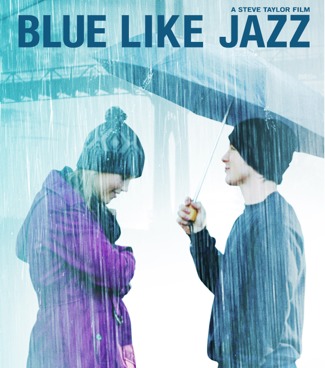If you receive a life-changing message, but the message is delivered to you by an untrustworthy messenger who doesn’t even seem to believe in the message, would the message be nullified? Wouldn’t you be tempted to justify throwing out the baby with the bathwater? That is the question that I keep thinking about after watching the inspiring movie “Blue Like Jazz”.
(Disclaimer: I am one of the people who offered financial support toward the Kickstarter campaign to fund the production of the “Blue Like Jazz” movie, which opened to theaters on April 13, 2012.)
There is a huge crisis for youths growing up in churches. Rainer Research found that 70% of youth will drop out of church between the ages of 18 to 22, and Barna Research found that 80% will be disengaged by the time they’re 29 (source). But if you track the history of youth ministry in church, the current trend is still trying to use the attraction-oriented and entertainment-oriented programs to make church cool and hip and get people in the door, and to make the gospel message a safe pill to swallow (source).
And that is where “Blue Like Jazz” the movie starts at. Young Don found himself in a youth ministry playing games all night long, preaching the “Jesus makes me happy” and “Jesus is my amigo” message. But when he realizes that the people there didn’t even believe the gospel message themselves, putting up happy faces but living as hypocrites, he was disillusioned and decided to leave that whole Churchianity subculture behind. And when you’ve been living in that subculture all your life growing up, and you’re trying to leave it, you find that you have a void in your life that you have to quickly fill it with something else. That “something else” is a liberal university life.
At Reed College, Don found many people who claim to be “liberated.” He tried to do as many weird, wacko, not-his-normal-self type of things as he could participate in. But he also sensed some uneasiness. First of all, he questioned: is this really liberation, or are people just “lost in a sea of individuality”? Also, it seems that although he’s running away from church and away from God, Don keeps on seeing God everywhere. He sees people struggling with faith rationally (like the “Does God Exists?” poster he kept seeing). But more importantly, he found that many of his “liberated” friends had also been negatively influenced by encounters with false teachings and hypocritical so-called “Christians.”
One of Don’s main struggles was whether his belief in Christ made any sense to his world. Should he keep compartmentalizing and privatizing his faith? The saving grace for Don in the movie, as it was also in the book, was Penny, who was able to live out her faith without disengaging from the world. And in the process, Don realized that although the church was fallible, it should not cause him to run away from or be ashamed of Jesus.
Here’s what I learned from the movie:
1. Churches need to stop trying to make Jesus relevant and keep things safe. Jesus is already relevant. We need to repent of our futile attempts to use “fun” to get people to come to church, and to stop emphasizing those therapeutic (like “Jesus will take care of you”) and moralistic (like “be nice” or “be kind”) messages. Preach the unadulterated, life-changing gospel message to our youths, and also live that the gospel ourselves.
2. Being “free” is not about being doing whatever you want to do. It is not about being in control of your life and destiny. True freedom is about letting God take control of you.
3. If you are struggling with faith in Christ, know that although the church might have failed you, keep looking to Jesus. We humans tend to think we can do it ourselves, but we are all sinners in need of God’s mercy and grace.
4. Keep asking questions.
“Blue Like Jazz” the movie has a honest message that is much needed for us to hear today. And it is an especially important film for the many youths and young adults who have been brought up in the church and are struggling with disillusions of faith.
PS: I really like Jeffrey Overstreet’s review of “Blue Like Jazz.” I encourage you to read it.


One thought on ““Blue Like Jazz” the movie: My Thoughts”
Comments are closed.